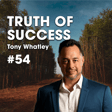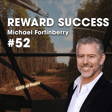Become a Creator today!Start creating today - Share your story with the world!
Start for free
00:00:00
00:00:01

Maximize Your Money: Real Tax Strategies from Tyler McBroom, Top CPA and CFO Partner to Tony Robbins
Welcome back to another edition of The Better Contractor. In this episode, Brent Oberlink is joined by Tyler McBroom. Tyler is a CPA, author, and Tony Robbins Business Mastery speaker, who breaks down real tax-saving strategies that every contractor needs to hear. From industry benchmarking to smart write-offs and balancing your tax bill with your financing goals, Tyler shows you how to stop leaving money on the table and start scaling smarter.
#ContractorTaxTips #BetterContractor #TylerMcBroom #TRMCPA #TonyRobbins #SmallBusinessTaxes #ConstructionBusiness #CPAForContractors #CashFlowAndGrow #BusinessMastery #TaxPlanning #ContractorAccounting #Taxes
Transcript
00:00:00
Speaker
You want to boss up your life? All you got to do is get in with me. I don't even pay to get in the club. They know I'm a walking tee. I'm presidential leaving the club. We ain't stopping at no lights. You want to be a boss?
00:00:10
Speaker
You got to pay the price. Welcome back to another edition of the Better Contractor. Today, I'm joined by Tyler McBroom. I'm very excited to have Tyler on.
00:00:22
Speaker
He's, you know, owner of TRM. Is that right, Tyler? TRM? TRM. TRM CPA. And he also has a book um called Cash Flow and Grow. So that's kind of cool.
00:00:33
Speaker
And also affiliated with Tony Robbins and his business series. So tell us us a little bit about yourself, Tyler, and kind of what all you're doing now. Yeah. So I'm primarily, i on own a CPA firm. That's my you know my day job, if you will. And ah so
Introduction to Tyler McBroom and His Work
00:00:49
Speaker
our focus is helping business owners pay as little tax as possible and and keep more of what they make.
00:00:54
Speaker
And so we work with business owners all over the country doing that. And also have been putting out content for a long time, sharing you know free tax tips and things like that. And so I like to do that. And then our our partnership, we have ah ah my firm has a joint venture with Tony Robbins. And so ah we're we're one of four firms worldwide that's in business.
00:01:15
Speaker
Global Accounting Advisors Alliance. And so everyone who goes to his business mastery event, ah where i I teach on the the power of tax planning, getting a second opinion on your taxes, and also the importance of knowing your numbers and you know thinking like a CFO.
00:01:29
Speaker
And then we give everyone a free review of their taxes while they're at the event. And so um so that's been a fun experience. And you know there's nothing quite like Tony's stage. so He does an amazing job at it. Yeah, yeah.
00:01:41
Speaker
So that's cool. Cause I, remember meeting you a few years back and I'll just be honest. There's not a lot of accountants that I would follow on social media as a whole.
00:01:52
Speaker
It's just kind of dry, but I will say i follow you and I love your content. It's always helpful. It's always engaging. it's just a little bit different outside the box. And so guys, if you're, Obviously, if you're listening to this podcast, you're probably a business owner or something in that line.
00:02:07
Speaker
I would definitely follow Tyler. Some really super helpful tips there. So ah appreciate what but you're doing out there on that. Well, thank you. Try to make it fun. You know, taxes, people people don't think taxes are very sexy, but then when you you learn how to save, you know, 20, 30, $40,000, it suddenly gets a lot sexier.
00:02:23
Speaker
and And then if you can make it fun, make it entertaining, you know, then people learn a little more. Yeah.
Building Company Culture and Team Dynamics
00:02:29
Speaker
Well, let's just jump right into it. If you had to pick one... Big tip, like, you know, over the course of your career, what is one thing if if you were a contractor? So a lot of our listeners we've kind of noticed are in that million to five to 10 million revenue range. So they're kind of getting started, got their feet wet and they're trying to grow this thing.
00:02:47
Speaker
What is something you would tell that specific audience? Related to like their numbers and taxes or just running a business in general? More just running a business in general. I think for me, the the biggest piece, if I look back on what has helped me sort of differentiate myself and be successful, ah there's you know there's the marketing and learning all those skills, but the number one differentiator is an obsession with culture.
00:03:15
Speaker
And so I think if you can, and culture is one of those things where you can either let it happen to you or you can be intentional about building it. And, and so I've always been a huge believer in investing in the culture, you know, having strong core values, team events, we're, we're, we're a fully remote company, but we fly our team out a couple times a year.
00:03:36
Speaker
Like we did Nashville in October, we're doing Disney World next month. And so in and our community. our team just loves working for them. And that's one of my biggest things that I'm most proud of.
00:03:47
Speaker
And we were actually just ranked by best companies group, number one, small employer under 50 employees in the country to work for. So, um ily so thank you. So, so yes, I think that's been,
00:04:00
Speaker
if I say think of one thing that's made the most difference, because especially in the last few years, the battle, and I know it's true in the contractor world, the battle battle for talent is as strong and hard as it's ever been.
00:04:14
Speaker
And so, that you know, culture is all you got when it comes to recruiting and bringing on and keeping great talent. Oh, yeah. Yeah.
Explaining Tax Strategies and Section 179 Benefits
00:04:22
Speaker
No, it is. um So your company, TRM, has how many employees approximately? Yeah.
00:04:27
Speaker
About 20 right now and hiring a few more currently. And you're all over the country, basically. All over the country. yeah we have We have clients in probably 35 states and team members in six or seven states.
00:04:40
Speaker
Okay. so what's but yeah Headquarters down here in South Florida. Okay. Nice. Nice. Let's go to your main expertise. So same question, a but a little bit more on the tax side. Yeah. lot of contractors, they think, Hey, section 179, that is where everything's at for me. Yeah.
00:04:55
Speaker
But as you and I both know, doing that too much can also get you into some trouble as well. So I'm just going kind of see your thoughts on section 179. Cause like a banker, obviously, you know, you know, someone like that, they, they want to see, you know, a little bit more profit.
00:05:08
Speaker
Yeah. know, as a contractor, you're like, let's get rid of some of that. Right. Not pay my tax. So. anyway well Well, the nice thing about Section 179 related to a banker is that depreciation, there's certain certain items that are called addbacks, meaning you show a certain profit for tax purposes on your tax return, and then a lender will add back different expenses. So things like interest, depreciation is one of those.
00:05:32
Speaker
So section 179 is essentially a way to accelerate depreciation it all into the year of purchase instead of on a piece of equipment over five or seven years. So you're you're essentially borrowing from next year's dollars, right? You're accelerating them into this year.
00:05:51
Speaker
Now, Every business owner I know would rather take a deduction and save taxes this year rather than waiting for five years. Right. So so I do think it's it's valuable.
00:06:01
Speaker
um The biggest mistake that I see people make an opportunity for a perspective shift comes in December when they think I got to go buy a bunch of equipment to save taxes. Right.
00:06:15
Speaker
Because here's the thing. If you go and buy $100,000 of equipment and you're in a 35% tax bracket, it's going to save you $35,000 if you take section 179 and all of that. But you still got to spend $100,000 to save the $35,000. So that's sort of like going to the mall and seeing that there's a 35% sale on some you know big screen TV. And you're like, well, I can't afford not to buy it.
00:06:36
Speaker
It still costs you money to buy it. so the You always want to look at it through the lens of does my business need that piece of equipment rather than I'm just going to go buy the G-Wagon because it's a write-off.
00:06:49
Speaker
Yeah. So, but yeah, so basically was this something the business needed regardless yeah of my tax situation? If you're going to buy it anyways, then buy it and then do it before the end of the year to get the tax deduction this year rather than wait until January 20th or something like that.
00:07:03
Speaker
yeah But don't go buy a bunch of equipment just because, you quote, it's a write-off. Because a lot of people think that, you know, there's so much out there where people are like, oh, it's a write-off, so it's free.
00:07:13
Speaker
Well, that's not the case. It's a write-off, so it's discounted, but it's not free. Yeah. Yeah.
Mastering Cash Flow and Bookkeeping
00:07:19
Speaker
Yeah. That was just something I know a lot of contractors do. Another one um I have you speak to a little bit is cashflow.
00:07:25
Speaker
You know, contractors are, well, not, not just us, any business, especially I think in today's climate, I feel like there's a lot of people struggling with cashflow right now. Yeah. know, obviously there's ways to help that out with, we had Jonathan Federer on a while back. Oh, awesome. Yeah. So he was talking about invoice factoring and stuff like that to get your receivables little quicker, you know, there's options like that, it's kind of curious from more of a CPA's perspective.
00:07:46
Speaker
If you were on this side of the aisle, what was some tips that you would give a contractor entrepreneur? Yeah. So I think one of the very most but like most powerful activities a business owner can do, and this is assuming they've got their books accurate. So that's like the foundation, right? Keeping a set of books. Don't just manage your business by your bank account.
00:08:06
Speaker
ah But it's doing something called an industry benchmark analysis. And what that is, is it's, let's say you're a ah general contractor doing $5 million dollars a year in revenue.
00:08:17
Speaker
You can get access to a database that says, what are all of the general contractors in the country or in your state that are doing close to 5 million in revenue?
00:08:28
Speaker
What are they spending on payroll? What are they spending on marketing? What are they spending on rent? How much equipment do they have on the balance sheet? How much accounts receivable do they have? Accounts payable do they have? And so then you take the averages and then you map your numbers against those.
00:08:43
Speaker
And then you can see where the gaps are, where they're either where areas where you're crushing it or areas where you're really doing a poor job. And then you want to look at those numbers and say, why is that the case?
00:08:55
Speaker
And is it okay? So sometimes, like for me, if you look at an accounting firm, most accounting firms spend all of a half a percent per year of their revenue on advertising or marketing.
00:09:07
Speaker
I spend a much higher percentage on that. Most firms are also growing 5% per year, not 80% per year. So I'll take the higher ad spend percentage as for the the higher growth. So it's not necessarily like look at squeezing everything. to It all needs to be the lowest percentage.
00:09:24
Speaker
But if you don't look at those numbers, then you're just kind of flying blind, making decisions by a gut feel rather than making decisions from an informed education place of this is what the best education and the average are doing in my business.
00:09:39
Speaker
So then you can kind of take that and pull and tweak those different levers to help with managing your cash flow. and And a lot of times, the you know when you think about you know about managing cash flow and in particular paying your bills, so like accounts payable,
00:09:59
Speaker
In personal budget terms, not having debt or outstanding bills that are multiple months behind is a good thing. In business, it might not be the best move. If you can negotiate with your vendors and partners to pay every 90 days instead of every 30 days, it's the same expense, but now you get to use and hold onto that cash for longer. So it's not always a bad thing that your accounts payable goes up, actually.
00:10:29
Speaker
Yeah, no, that's good. and You said that was called industry benchmark analysis. Yeah. And so where you get those, because that's the number one, that's a question that comes up a lot is how do I access those numbers is lot of times different publications and magazines in your industry will send out an annual survey.
00:10:44
Speaker
And if you participate in the survey, then they'll send you the feedback or, you you know If your accountant does any sort of advisory work at all, you can reach out to them. and they like We have a database of a bunch of different industries that we can pull numbers for.
00:10:58
Speaker
and And so any accountant that you know does that kind of work should be able to help you with that. Okay. Now, that's something I had. Honestly, you're teaching me right now. I did not even think about doing something like that.
00:11:09
Speaker
what is What is something you think a lot of contractors do wrong when it comes to tax prep and tax planning at the end year? I think... ah two things. The first I kind of hinted at earlier is they don't prioritize their books enough or they don't have books at all.
00:11:26
Speaker
They just, I always say like wait, especially like early on, early stage entrepreneurs, they they do what call manage their business by bank balance. So that's, you wake up in the morning, you pull up your phone, you log into your bank.
00:11:39
Speaker
And if there's money in there, then you spend it. And if there's not, then you don't. And, and so having an actual set of books, helps you make actual decisions from your numbers rather than just gut feel or whether there's money in the bank or not.
00:11:56
Speaker
And then the other piece that it does is it helps you save taxes because if you're just kind of doing an Excel sheet and kind of making up your numbers and you send in your you know estimated expenses to your accountant at tax time.
00:12:10
Speaker
Well, think about this between federal taxes and state taxes, depending on what state you're in. And then if, if you're not an S corporation, you might have self-employment tax, which is 15% on top of income tax.
00:12:21
Speaker
And, you could have up to 50 cents of every dollar you miss as a deduction because you aren't tracking your expenses is going to a tax bill that you shouldn't be paying if you were tracking your numbers right. So if you miss $10,000 of expenses, that could be five grand that you're cutting check to Uncle Sam at tax time because you're not deducting expenses you're already paying for because you didn't keep accurate records.
00:12:44
Speaker
So not doing
Balancing Tax Planning with Business Goals
00:12:45
Speaker
books. And then the other piece is they only meet with their accountant at tax filing time rather than actually doing tax planning throughout the year.
00:12:55
Speaker
Because in the United States, there's two tax codes. There's a tax code for employees, And there's a tax code for business owners. And the tax code for employees, basically your tax return has one correct answer.
00:13:10
Speaker
Yes, you can buy a home to write off your mortgage interest. You can give some money away to charity. ah You can have a whole bunch of medical expenses, which no one ever wants. ah But pretty much other than those couple things, your tax bill has one correct answer.
00:13:24
Speaker
But on the business owner side of things, it opens up a whole new world of tax planning. So the tax code literally is so thick that if we printed it out and you stacked it up on your desk right there and held it in front of you, I could stand across the room with a Colt 45 Magnum and fire it at you and it would not pierce through all the way to you. It's so thick. And most of what's in there is for business owners to take advantage of.
00:13:46
Speaker
And so if all you're doing is meeting with your accountant at tax filing time, they're just filling out the forms. They're being historians at that point. They're not actually doing something to save you taxes. So what you want to do is at the very least meet sometime in the fourth quarter of the year.
00:14:03
Speaker
So that we can take your year-to-date numbers and project out what you think you're going to make in the last couple months of the year. And then calculate, if you do nothing, this is what you're going to owe in taxes. Let's do X, Y, z Buy that piece of equipment.
00:14:17
Speaker
Make sure you you know get your kids on the payroll. you'll Rent your home out to your business. Whatever whatever it might be. and then And then you get your list of marching orders to execute before the end of the year. Because once the clock strikes midnight on on New Year's Eve and the ball drops in Times Square,
00:14:31
Speaker
you know, that's the end of what when we can actually do something about your tax bill. So you want to meet at least in q four Most of our clients are meeting with us about two to three times a year because we can identify the strategies and then months can go by and you forget to implement them.
00:14:46
Speaker
And so we want to make sure we're having checkpoint meetings throughout the year to, to make sure that you're cutting whatever checks you need to do. And you're taking care of documentation on whatever strategies might make sense for you to save, save money. Yeah.
00:14:57
Speaker
Yeah. That kind brings up a funny story. Um, ah Our accountant that we started with originally has retired. I remember he used to call me in about October every year, and he'd be hey, Brent, I'm just curious, starting to look at your your records and your books, how much do you want to pay?
00:15:15
Speaker
That's a weird question. Yeah. But anyway, he always that's where we always started. Where do you want to pay? Right. Yeah. Well, and that's that's a mistake that a lot of people make too is you've got to balance your tax bill. You mentioned banker earlier. You've got to balance your tax bill with your financial goals because if you're trying to scale your business using debt and you need to get financing, whether it's for equipment or just for working capital, or you're trying to build a real estate portfolio and go out get loans for rental properties,
00:15:50
Speaker
We can tax plan you into the poorhouse so that you show zero on paper. You can't even qualify for a massage chair loan. you know But but if if you can't meet your borrowing needs, then you might be shooting yourself in the foot because you're taking yourself down too low on the tax planning side. And then your lender's going, what are you doing to me here? i can't I can't help you with this.
00:16:09
Speaker
Yeah, that's a very good point. I've seen a lot of people make that mistake. A lot of people make that mistake. Yeah, and so like one of the very first questions we always ask is, hey, do you have any borrowing needs coming up in the next couple years? So that in a perfect world, you get your taxable income down to exactly where you need to be to qualify for your loan so that you're saving taxes and not paying a penny more than you need to, but you can still meet your other financial goals.
00:16:31
Speaker
Yeah, no, that's that's an awesome point. And that's good way to look at it. Yeah, and then kind of further along that of times when it maybe doesn't make sense to take a tax deduction is if you're ever at a point where you're wanting to sell your company.
00:16:42
Speaker
So a couple years outside of an exit. So a lot of companies are valued based on a multiple of earnings. So let's say it's a 5X earnings multiple. If your business profits $100,000, it's worth $500,000. Well, if you take a $10,000 deduction, you might save yourself $3,000 in tax. But when a ah ah potential buyer goes to look at it, you just cost yourself $50,000 valuation.
00:17:09
Speaker
And so when you're scaling, you want to pay as little tax as possible. And then when you're moving towards an exit over the next couple years, then you want to pull it back and start taking, you know, a higher income in it's worth paying a little more in taxes to get that enterprise value up.
00:17:26
Speaker
Yeah. Yeah.
Navigating Economic Challenges
00:17:27
Speaker
I've noticed a couple of the forums I'm in that are contractors either in our own or other ones, Facebook groups. That's something that's brought up a little bit. I've seen some, some of the older contractors is,
00:17:36
Speaker
exiting and then trying to get all their financial strategy around it. But that's a really good point. If you're going through there and trying to knock that number back, but then also plan on trying to sell to, you know a bigger company, right? destroyed your, you just destroyed. Exactly. Yeah. Yeah.
00:17:51
Speaker
Um, I was curious too. So had a question here. I saw one of the Facebook groups that I thought would be good for you. Um, I wanted to ask you, how do you help business owners separate growth from profit? And why is that distinction so important?
00:18:04
Speaker
You said growth from profit? Yeah. um I mean, i think what you, to to do that, there's certain expense categories that are investments in growth, right? So like we're growing a lot. We have a lot of ad spend.
00:18:19
Speaker
We've got, you know, sales sales costs. We've got a full-time recruiter. Most accounting firms don't have a full-time recruiter on staff. And so our payroll as a percent of revenue, our ads as percent of revenue are going to be higher than most.
00:18:33
Speaker
And so to me, those are investments in growth. And so I think it's looking at what is your profit. you still but You still want to grow sustainably, even though growth does suck cash and growth sucks cash.
00:18:46
Speaker
I mean, it really does. So if you can identify what those growth metrics are that are eating into your bottom line, and then kind of add back what would we do if we weren't growing, ah then it kind of helps you get some clarity there.
00:19:01
Speaker
um And and it's it's really just, like I said before on the bay industry benchmark, is look at those numbers, is that okay and why? Or the other way around. Look at those numbers.
00:19:14
Speaker
Why are they that way and is that okay? And so you might be okay with ah a little bit smaller margin as long as yeah you're you're getting a good return on those growth investments.
00:19:25
Speaker
If you're spending a bunch of money on growth investments and you're growing 2% per year, then that's a that's a flag need be looking at. Yeah, okay. Yeah, that's good. One thing I tell a lot of guys...
00:19:37
Speaker
like my level in starting out below, like so below is to have your accountant, whether that's in-house accountant, like we do, or maybe someone they've hired like yourself or your firm. So I always say that you should have your accountant send you at least weekly or monthly, if not weekly, just some KPIs, some financials.
00:19:55
Speaker
I like to have mine charted from like year to date. and then a year ago, stuff like that. But was just kind of curious, like I have my list, I've told my accountant, like, hey, send me this stuff. What are some key KPIs and financials that you would recommend ah business owner request? so Yeah, so first off, you made a good point about comparing the prior year, right? And so so you want to look at, so there's, you want to have trend analysis as one of the most important pieces whenever you're looking at your KPIs, because a number on its own is fine, great that you're looking at it, but it's not near as meaningful um as it is in the context of either horizontal analysis, which is over time,
00:20:39
Speaker
or vertical analysis, which is that percent of revenue ah or percent of assets, right, so and on the balance sheet. And so some good KPIs, I think, are you want to have KPIs that are big numbers, that are actual levers that you can pull that make a big difference. And so um so obviously gross profit margin and then net profit margin, which gross profit margin is the percent of, if you take your sales minus your cost of goods sold, what's the percent of that? And then the net profit margin is all the way down to the bottom line. So including all of your operating costs, that's important because you want to have good margins.
00:21:18
Speaker
um Days of sales or days of expenses in cash, is a really powerful one because that's your runway. That helps you understand how much cash you have in the bank. that you could if If all of your revenue dried up, how long could you stay alive, basically?
00:21:34
Speaker
That's a super important one. If you have accounts receivable, days of sales in accounts receivable is a really powerful one. And when I say days of sales, it's it's essentially it's your average sales per day annually. So you take your annual sales, divide it by 365,
00:21:53
Speaker
So let's say you you have you're doing $365,000 year in revenue. You're doing $1,000 a day, right? And so if you have $10,000 of AR, you're 10 days sales in AR in that case. So that's some quick math.
00:22:08
Speaker
And why that matters more than the gross number is because it right sizes the accounts receivable or the accounts payable to your company. Because... If you have $250,000 accounts and you're a fifty million dollar company No big deal.
00:22:28
Speaker
if you're a two If you have $250,000 of accounts receivable and you're a $500,000 company, that's mayday, mayday, mayday. right So it's it's as a percent it's essentially as a percent of revenue. Same thing with accounts payable.
00:22:41
Speaker
um And so those are those are a few. And then kind of the big three expenses that I like to look at is payroll as a percent of revenue. yeah growth spend, so marketing as a percent of revenue.
00:22:57
Speaker
um And then cost goods sold, a gross profit margin. I'm trying to think if there's any others. um And then the other one, this is more of an accounting term, but um it's it's an important number, would be your current ratio.
00:23:15
Speaker
And that is your current assets divided by your current liabilities. And that's your less your liquidity measurement. So if you've got your cash, you know your days of ah days of expenses in cash, and they know your current ratio and your you know liquidity, then that's going to give you some really clear insights into how financially healthy your company is.
00:23:35
Speaker
Yeah, no, I love that. And i I started doing this a few years back, but I realized when I did that, I kind took a step back from trying to be so daily involved. and be more this type of stuff. And I realized when you look at that, I like it weekly. I look at it every Friday.
00:23:50
Speaker
It's just something calendar for like an hour. It's just something i dive into. I love it because it it makes you stay on point. And we had a previous podcast guest one time that talked about growing your company always with the end in mind or always it for sale.
00:24:04
Speaker
So some of our KPIs are kind of geared towards that. So yeah if I want to sell it in 10 years, 20 years, whatever, am I doing things today to get get to where I want to be? Yeah. So, um, one other thing I had, I, again, so this is,
00:24:18
Speaker
This podcast is for contractors. So one of the things I had noticed in a couple of our Facebook groups and one of the questions I asked in one of them was, are you seeing like declining sales right now?
00:24:29
Speaker
What is the temperature and feel of your business in this current climate, this current economy? And it got a lot of negative, you know, you know yeah people are struggling with sales. lot of people are struggling with cashflow. A lot of people are just, you know,
00:24:42
Speaker
like feeling like the market's just not there and they're not going to make as much at 25 as they had hoped, or maybe not even as much as they did 23 or 24. ah So my next question going be geared to around more of that contractor, that entrepreneur is who was like, you know what?
00:24:56
Speaker
I don't think 25 is going to be a good year for me at all. Right. What are some tips you would give them as far as like, I'm going to call it like ah business turnaround or something like that to where, Hey, they're trying to get back out of this and back onto, you know, a more positive stance. Yeah.
00:25:10
Speaker
Yeah, i think I think number one is in those seasons, cash flow becomes, I mean, cash flow is always critical, but it becomes an absolute top focus is getting an eye on your cash. So you mentioned looking at Metrix Weekly.
00:25:26
Speaker
Absolutely have a cash flow for a weekly cash flow forecast so you know what cash is coming in next week and for the next four weeks and what cash is going out. so having ah And it doesn't have to be complicated.
00:25:39
Speaker
It can be on a Google sheet yeah if you're kind of in that phase of of your business. But just... Knowing where your cash is coming from and going to is is what's going to keep you surviving through those those areas.
00:25:54
Speaker
um The other thing that I would look at is if you're offering multiple, don't know if it's multiple services or you're working on different types of jobs, whether, you know, let's say it's new home builds versus custom home builds.
00:26:10
Speaker
Look at which ones are more profitable. And then if you're going to be so having to squeeze the juice out of it and like work like way harder than you did to get a job than you ever did before, you might as well focus on the ones that are going to get you the most profit and margin on the cash flow.
00:26:30
Speaker
Because a lot of times people just look at what are the all the dollars coming in and all the dollars going out. Well, you might be having some areas that all the dollars are coming in, but it's only making 5% in the other area, some other area, and it's taking more of your time probably, whereas there's other clients or or types of jobs that you can work on that are super easy. they They close at a higher rate.
00:26:52
Speaker
They don't cost as much. there's not as much logistical headache. So if you've never done that exercise of looking at what are the different you sectors in your business, then because then you' you've got limited, limited time, limited resources.
00:27:06
Speaker
And if if things are scarcer than they used to be, it's not just flowing in an abundant. ah That's a good area to focus. And, you know, when times are growing, going great, it's revenue covers a lot of sins, right? And so so things can be going great. And then suddenly it dries up a little bit. And then you realize that,
00:27:24
Speaker
It wasn't that you were crushing it. It's just that you were allowed to be less disciplined. And so so i think tightening up all the cash, that's where the cashflow management, the KPIs, all the fundamentals of business become the the reason that people survive through those tough times.
00:27:41
Speaker
and And that's why when you look at all of the Fortune 100, Fortune 500 top companies, I think it's something like 80 to 90% of them started in recessions or depressions. And it's because you built the habits that it takes. And then when times get good, you're sweet, you've survived and there's not that many left.
00:28:00
Speaker
And then if you're doing all the things that you can, if you can thrive in the, you know, the tough times, then you're going to crush it in the other times. Yeah, no, that's
Traits of Successful Entrepreneurs
00:28:09
Speaker
awesome. And I think that's probably the same reason you see some people who have made it through those periods.
00:28:13
Speaker
The business ends up being better. You know, maybe not during that period, but it ends up being better later. It forces you to relook at your offers, your pricing, your you know your systems. How do we do this more effectively and more efficiently?
00:28:26
Speaker
It makes you better. And so, you know, the way I think it's a great time to to to revisit, kind of tinker, clean out, you know, figure out exactly what you know not just go you know fire people, but clean house in a way that makes you just look at things a little more intentionally.
00:28:44
Speaker
Yeah. I was to draw one point ah for the listeners too on the point you just made earlier about like looking at like if you're a contractor and you have two different segments that you're doing, and one of them is pulling like a 25% profit margin one's pulling 5%.
00:28:57
Speaker
Most contractors right now are having trouble hiring enough people as well. So this is another key point. If you don't have enough people to do everything you're offering, you should be steering the people you do have towards that higher profit ah market anyway. So just kind of want to add that in there because a lot people are suffering with that as well. So yeah, absolutely. Yeah.
00:29:15
Speaker
I'll switch us a little bit to more entrepreneurial mindset. So obviously you speak at a lot of Tony Robbins events and then you still you're around, I'm assuming thousands of entrepreneurs a year.
00:29:27
Speaker
What is something you think, and this is not really CPA related or tax related, but what's something you think a lot of those people have that are successful that you've noticed, Hey, almost everybody in that room, that room, that room has these two or three qualities. What, what would those be?
00:29:42
Speaker
I mean, I think that number one, you know, be nature of being at these events, I think number one is, and I know you're a big end to this is willingness to invest in yourself.
00:29:53
Speaker
I think that's that you personal growth. It's the best investment you can make. I mean, there's the skills that I've acquired from being in in those rooms and the people you meet, um it it just it raises your identity, it raises your skill sets, and just it allows you to to grow.
00:30:11
Speaker
i think that's that's one characteristic I see for sure, super
Real Estate Investment and Long-term Wealth
00:30:15
Speaker
consistent. um Another one that I see is the ability to pivot.
00:30:22
Speaker
And that's, you know, the, the, there's kind of a cliche, but the world's moving faster than ever. And the only constant is change. And, but we've seen even more of that, you know, after COVID and, and there were a lot of our clients that crushed it during COVID. And there were a lot of clients that didn't do so well, but the ones that crushed it are the ones that,
00:30:43
Speaker
looked at the world, where it's headed. They, they jumped in front of the, you know, the, the trend and they, and they pivoted. And we've had to do that countless times in our business and pivot the way we do things, the way we but you know price and structure.
00:30:56
Speaker
So I think it's, it's, it's pivot and kind of a ah second, like kind of a corollary related to that is that you're, yeah always tweaking and optimizing too. It's like never just like set it and forget it.
00:31:08
Speaker
It's like, let's you know figure out new ways of doing things, tweak it. And then that kind of goes together with the personal development piece too. ah There can be a dark side of that where you're always changing things. you know And so, so it's a, it's a balance, um but definitely personal development pivoting.
00:31:24
Speaker
um And then, you know, just, just the, the grit to always, always keep pushing and not, not give up. Yeah, no, I love that. I go to those as well. I would say that your last one was one of the ones I had in my mind was, you know, you see that all the time.
00:31:39
Speaker
Yeah. Um, the question I had, and I'm trying to understand this market a little more and curious if you have any knowledge. So, Real estate. So at what point and what what are the advantages? So let's say you're a contractor and you're doing pretty decent. You've been in business 10, 15, 20 years.
00:31:56
Speaker
You're like, you know what? Everybody keeps buzzing about real estate. So yeah what do i do and how how does that work into my business? was going to see if you could expand on that just little bit. Yeah. I mean, one thing that's great about real estate, I know a lot of wealthy people who've built their wealth in real estate. and So if you can if you can build a business that you can exit for a bunch of money one day, that's amazing. But if you can build a business that's a cash cow and you can pull the cash out and buy real estate that generates... you know the u you Over time, generally, real estate goes up, right? and So the stock market does too.
00:32:27
Speaker
ah But when when you hear about the tax benefits of real estate, one of the biggest... kind of benefits is something is depreciation expense. And it's been great, really great for the last few years because of something called bonus depreciation, which was they allowed you to carve out certain pieces of the the the building and the value and essentially take about 30% 30 to 40% of the value of your investment and take depreciation on that in the year you purchase it.
00:32:56
Speaker
And so it would be ah is a great way to accelerate that and just get a big tax advantage. And that's a lot of the ways that, you know everyone's like, oh, Trump paid no taxes. Well, it's because of taking advantage of the tax code that's in the real estate real estate world.
00:33:10
Speaker
the What people don't realize with that is in order to take full advantage of that accelerated depreciation, the the that you have to essentially be a real estate professional.
00:33:23
Speaker
because there's something called a passive activity loss limitation. And so rental real estate, if you're not a real estate professional, rental real estate is considered passive income.
00:33:35
Speaker
And pass so passive income or passive losses. And so if you take all this depreciation, it creates a big old loss, but it's a passive loss. And you can't deduct passive losses against active income, which is your business and income.
00:33:52
Speaker
And if you are a real estate professional, then you can treat all of those rental properties if you actively manage them as active income or active losses and then deduct against it.
00:34:04
Speaker
So some ways around that. So to be a real estate professional in the IRS's eyes doesn't mean you have to get your real estate like agent you know real estate agent license.
00:34:15
Speaker
ah It means that you've got to work at least seven, basically at least 750 hours a in real estate activities. in real estate activities And real estate has to be more than 50% of your income generating time and and and money.
00:34:33
Speaker
ah Basically, mostly time. And so if you're running a business and you're actively managing that business, it's pretty tough to meet that 50% rule unless you're yeah you're sleeping an hour and a half a night and you know you working 2,000 plus hours in real estate on top of your business.
00:34:48
Speaker
But If you have a spouse who stays at home and doesn't work, now suddenly they can spend all of their time managing the the the properties and make the spouse a real estate professional.
00:35:02
Speaker
Then that you file a joint return and suddenly that rental income is indeed active. So then it can offset. So that's a great way to do that if you still have a business and take advantage of of you know the real estate tax code.
Entrepreneurial Reflections and Personal Branding
00:35:17
Speaker
Okay. No, that's interesting. I was kind of curiously, I see a lot of people doing it and we've tinkered in it the last few years, but not to the level of of doing that. So I was kind of curious to see how that plays into like your long-term wealth strategy. So, yeah. And then, you over time real estate goes up and, you know, and so you've, you know, you got cashflow and, and, and expenses to offset it.
00:35:38
Speaker
And, yeah you know, it's nice. Oh, yeah. I got one final question for you, then I'll turn it over to you to tell me what I missed. Okay. Yeah. um So, obviously, you're not just a CPA. You're also an entrepreneur.
00:35:51
Speaker
And I like doing the podcast with fellow entrepreneurs and asking this question of what is one piece of advice that you're in your forties now, right? Uh, not quite. I'm close in a few months, in a few months yeah later this year. Yeah.
00:36:05
Speaker
So 20 years ago, what would you have told her 15 years ago? What would you have told Tyler McBroom to do different 15 years ago see where, what was 15 years That was 2010. Um,
00:36:19
Speaker
um
00:36:22
Speaker
You know, I think that i would have said... start your business sooner. So i I went the, ah I was an employee for several years.
00:36:35
Speaker
ah I dabbled in, i dabbled in i worked for, my degree was actually in creative writing. ah um My dad was an accountant. I didn't want to be an accountant. I didn't want to plug numbers into a box, sit behind a computer.
00:36:48
Speaker
And then I graduated with a creative writing degree and realized that being broke sucks. So then I worked for, you know, marketing agency and then I worked for an HOA management company. I did all these different things. And, uh, and then there's an employee for a couple of years and got the opportunity to then, uh, you know, have, you know, partner with my dad and then be, ah be an entrepreneur.
00:37:07
Speaker
Um, but the, the, the, experience that you need running a business, you get by running a business. And the people that the have the biggest skill sets don't always make the best business owners. and and And so it's it's about taking risks.
00:37:31
Speaker
and that's where you get the reward from. And so I think that I would have, I would have said, start the business earlier, become a business owner earlier. Don't, don't, don't dabble in all this other, you know, employee stuff because yeah it's, yeah you get the experience and you, you know, that much further along.
00:37:48
Speaker
So I think that's one. ah I think I also would say um as far as something that's like a you know, change, but I would also say, know, Invest in social media like you did.
00:38:01
Speaker
Like, you know, so like i' had been I'd been, ah kind of learned, learned about the whole social media business world and kind of 2010, 2011, right as i was finishing up grad school and really put a big focus on that early in my career. Not very many accountants, you know, know um there still aren't any accountants out there doing it.
00:38:18
Speaker
ah But I think that has been something that has given me an outsized return in terms of like, you know just personal brand and the, the, the life benefits that come from having a personal brand has led me in my partnership with Tony Robbins. And, and so I think that and investing in a personal brand and, and, and doing more of that, like more, you know, spend, spend money on ads sooner, like, you know, and invest in that growth sooner, um, uh, would have been, I'd say, you you're on the right path with that.
00:38:48
Speaker
Yeah. Was that something natural for you to do the personal brand or was that something you had to force yourself to do? It's more natural then than most, I think. I know a lot of people get in front of a camera and it's really awkward to the second that camera turns on.
00:39:01
Speaker
ah In grad school, there's actually, they're they're unlisted now, but on my YouTube channel, there was, I actually, during grad school, I created a a country music and beer reviews YouTube channel called Honky Talk.
00:39:14
Speaker
Okay. Honky talk Tyler. And I'd put on a cowboy hat and I'd, you know, so like I was always kind of having fun with it. And I, I enjoy the creative side of things. Uh, I've got a ah young adult children's novel that I wrote in college. And, and so I've always kind of enjoyed, yeah the creative piece and, uh, and speaking, and then the accounting kind of came second.
00:39:36
Speaker
Uh, and, and so that's served me well and sort of having a unique, you know, point in the, in the marketplace with that. As I say, I feel like that's probably a unique personality combination of having the creative mix with the accounting because I know a lot of accountants aren't as usually creative. So that's, yeah i was I was just at a workshop with Alex Hormozzi couple weeks ago ah where he was breaking down our businesses and he was like, you're good at the razzle dazzle.
00:40:01
Speaker
And the guy sitting next to me was like an accountant with razzle dazzle. What's Who is this guy? Who is this guy? so That's awesome. Yeah. So, yeah. so So, how did you kind of find that niche then in the, like, so creating your personal brand? A lot of, I know a lot of people, myself included, are like contracting. That's not really that interesting, you know? Yeah. Well, and neither is taxes.
00:40:22
Speaker
Yeah, exactly. You know, ah you know, I, so I, I really started taking content seriously in, um in 2017 okay i decided yeah we were starting to grow like giving speeches and stuff and i really wanted to bring on a full-time videographer and so started doing that and i was i was just i literally like i had i had snapchat up and i was talking about depreciation with like laser filters on my eyes and just stupid stuff and like, and just testing and seeing what works. And, and then I would just, you know I was, now I don't do as much direct client work. I've got a team to do that, but I was working with clients a whole bunch at that point in my career.
00:41:03
Speaker
And so I would just take the questions that my clients were asking me and answer them as if they were you know as as I was talking to them. And that was the content. And then and then over eventually, i got a big enough audience where I was able to they would ah start get DMs of questions. And so then the content started creating itself.
00:41:22
Speaker
um But it's a muscle just like working out. It's a muscle that at first it takes intention. And then eventually it's like when you when you start to, you know, at first you work out and you're sore and then you work out a little more and you get used to it. And then you get to a point where when you miss a workout, you kind of crave it.
00:41:40
Speaker
And it's the same thing with creating content. Like it's one of those things where at first it's awkward. At first it's like, you got to push it. It's going to make you uncomfortable. and it's like, oh, this has taken time out of my day. and and I've got other things to worry about.
00:41:51
Speaker
And then you get to a point where you see content ideas everywhere. And then you kind of like just do it automatically. Yeah. I love that. I know you used the word help or ah you were talking, I thought helpful.
00:42:03
Speaker
So I remember a lot of your content, you know, I think Andy for sale actually mentioned it. It needs to be helpful and entertaining, or at least, you hopefully both. And that's one thing you've done a good job of if is taking something that may or may not, depends who you are, may or may not be that interesting. Right.
00:42:18
Speaker
You've made it somewhat interesting, but then also if you're a business owner, it's obviously helpful as well. Yeah, well, thank you. I appreciate that. Yeah, Trying to keep it entertaining. Yes. um So kind of the last one I got here is actually to open it back up to you and tell me what missed or what you would want to tell our audience.
00:42:36
Speaker
So just kind of open floor. Yeah. um Just yeah from a CPA standpoint, just leave them with a couple quick tax tips that they can do and literally knock a few thousand dollars off the tax bill just from listening to this.
00:42:50
Speaker
um So a common tax tip, number one is if you're not at an S corporation and you're doing over 60 grand a year in profit,
00:43:01
Speaker
Definitely talk to your accountant about doing that because you're probably costing yourself a whole bunch of money in self-employment tax unless you're in, there's a couple states where it doesn't make sense. um But your audit risk is also almost 10 times less than it is like audit chances than it is if you're a sole proprietorship.
00:43:18
Speaker
Next is
Practical Tax Tips and Social Media Engagement
00:43:19
Speaker
if you own your home, take advantage of a rule called the Augusta rule. And that's a rule that says you can rent your home up to 14 days per year tax-free. It's called the Augusta rule because every year when the Masters Golf Tournament comes to Augusta, Georgia, all the people who live there go literally I was just there last at the tournament just a couple weeks ago, and i I was talking with one of the employees, and she literally was doing this, renting her home out for the whole week of the tournament, and she had an RV that she pulled over up to her parents' house and was staying in that and renting her home out for 50 grand or something like that.
00:43:52
Speaker
And it's all tax free. But how you can use that for yourself and your business is if you have a an office outside of the home, once a month, hold a shareholder board meeting at your house, rent it out to your business for the use of that house.
00:44:05
Speaker
And you cut a ah check from your business account to your personal account. It's tax deductible as rent expense to the business and tax free rental income to you. So ah you know you can get 10 to 20 grand a year out of your business tax free by doing that.
00:44:19
Speaker
Now you wanna make sure you're documenting the business purpose and what happened at those meetings, actually moving the money and then paying yourself a reasonable amount for rent. you know If your home's worth 500 grand, you can't do $50,000 a day.
00:44:33
Speaker
It's not gonna fly, maybe $1,000 a day. ah But that's a great way to easily get you know a few grand a year off your tax bill. If you've got kids, if they're under 18 and you pay them from a sole proprietorship, they're exempt from payroll taxes and they can earn up to $15,000 a year tax-free in 2025.
00:44:55
Speaker
And so look at getting your kids on the payroll. Now they got to do something for that wage. A lot of our younger clients with younger kids will have, you know, they'll hire their kids as models or they'll have them help with their social media ah or you know, you can have them, you know help with sales calls or admin paperwork, things like that.
00:45:11
Speaker
and Those are, those are a couple, just two or three things, quick, easy things you can do, uh, to knock a few grand off your taxes. If you've got any of those situations, that's worth listening to the podcast right there.
00:45:23
Speaker
There you go. Well, Tyler, um absolutely awesome podcast. Thrilled to have you on. Wealth of knowledge, guys. But where can everyone find you? Yeah, so um all over, all the social media channels put out daily free content. So ah Instagram and YouTube is at Tyler McBroom. TikTok and X or Twitter is Tyler McBroom CPA.
00:45:47
Speaker
Someone got my name before I could get man. um But yeah, so ah follow me there. ah there's And then on all those pages, there's ways to reach out and connect if you want to have a conversation further about tax planning or any of that.
00:46:02
Speaker
Awesome. Well, guys, Tyler is someone you definitely want to follow. Like I said, free advice, helpful advice all over the internet from him. um And obviously, if you need an accountant, his firm is good.
00:46:13
Speaker
So guys, check him out. Tyler, thank you so, so much. Thanks for having me. Have fun. See you guys.



















